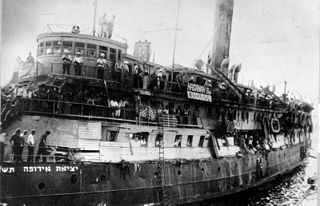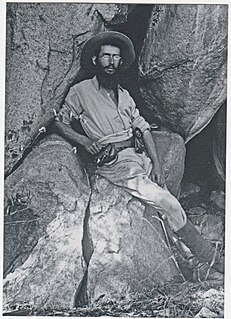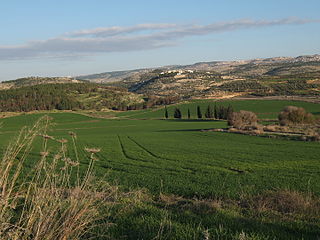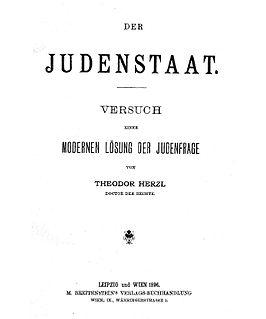
This is a partial timeline of Zionism in the modern era, since the start of the 16th century.

A homeland for the Jewish people is an idea rooted in Jewish culture and religion. In the early 19th century, the Napoleonic Wars led to the idea of Jewish emancipation. This unleashed a number of religious and secular cultural streams and political philosophies among the Jews in Europe, covering everything from Marxism to Chassidism. Among these movements was Zionism as promoted by Theodore Herzl. In the late 19th century, Herzl set out his vision of a Jewish state and homeland for the Jewish people in his book Der Judenstaat. Herzl was later hailed by the Zionist political parties as the founding father of the State of Israel.

Israel Zangwill was a British author at the forefront of cultural Zionism during the 19th century, and was a close associate of Theodor Herzl. He later rejected the search for a Jewish homeland in Palestine and became the prime thinker behind the territorial movement.

The World Zionist Organization, or WZO, is a non-governmental organization that promotes Zionism. It was founded as the Zionist Organization at the initiative of Theodor Herzl at the First World Zionist Congress, which took place in August 1897 in Basel, Switzerland. When it was founded, the goals of the Zionist movement were stated in a resolution that came of that Congress and came to be known as the Basel Program.

The Uganda Scheme was a plan in the early 1900s to give a portion of British East Africa to the Jewish people as a homeland. It drew support from Theodor Herzl, a prominent Zionist, as a temporary refuge for European Jews facing antisemitism.
Jewish political movements refer to the organized efforts of Jews to build their own political parties or otherwise represent their interest in politics outside the Jewish community. From the time of the siege of Jerusalem by the Romans to the foundation of Israel the Jewish people had no territory, and, until the 19th century they by-and-large were also denied equal rights in the countries in which they lived. Thus, until the 19th century effort for the emancipation of the Jews, almost all Jewish political struggles were internal, and dealt primarily with either religious issues or issues of a particular Jewish community.

Cultural Zionism is a strain of the concept of Zionism that values creating a Jewish state with its own secular Jewish culture and history, including language and historical roots, rather than other Zionist ideas such as political Zionism. The man considered to have founded the concept of cultural Zionism is Asher Ginsberg, better known as Ahad Ha'am. With his secular vision of a Jewish "spiritual center" in Israel, he confronted Theodor Herzl. Unlike Herzl, the founder of political Zionism, Ha'am strived for "a Jewish state and not merely a state of Jews".

Agricultural colonies in Argentina were a demographically and economically important part of the evolution of the country. The Argentine government, faced with large areas of fertile land that were unpopulated or settled by aboriginal tribes, encouraged European immigration, welcoming settling agreements with countries, regions and associations abroad.

The Second Aliyah was an important and highly influential aliyah that took place between 1904 and 1914, during which approximately 35,000 Jews immigrated into Ottoman-ruled Palestine, mostly from the Russian Empire, some from Yemen.
There were several proposals for a Jewish state in the course of Jewish history between the destruction of ancient Israel and the founding of the modern State of Israel. While some of those have come into existence, others were never implemented. The Jewish national homeland usually refers to the State of Israel or the Land of Israel, depending on political and religious beliefs. Jews and their supporters, as well as their detractors and anti-Semites have put forth plans for Jewish states.

First Zionist Congress was the inaugural congress of the Zionist Organization (ZO) held in Basel (Basle), Switzerland, from August 29 to August 31, 1897. 208 delegates and 26 press correspondents attended the event. It was convened and chaired by Theodor Herzl, the founder of the modern Zionism movement. The Congress formulated a Zionist platform, known as the Basel program, and founded the Zionist Organization. It also adopted the Hatikvah as its anthem.
Zionism as an organized movement is generally considered to have been founded by Theodor Herzl in 1897. However, the history of Zionism began earlier and is related to Judaism and Jewish history. The Hovevei Zion, or the Lovers of Zion, were responsible for the creation of 20 new Jewish cities in Palestine between 1870 and 1897.

L. J. Greenberg, born Leopold Jacob Greenberg (1861–1931), was a British journalist. He had become an energetic propagandist of the new Zionism in England by the Third Zionist Congress in 1899, at which he and Jacob de Haas were elected as members of the ZO's Propaganda Committee. His frequent dialectical debates were conducted as editor of The Jewish Chronicle, the leading paper in Britain for the Jewish community. Greenberg called for decency and humanity towards World Jewry.
This timeline of anti-Zionism chronicles the history of anti-Zionism, including events in the history of anti-Zionist thought.

Israel Cohen was an Anglo-Jewish, Zionist leader, writer, and journalist.

Leopold Kessler (1864–1944) was an engineer, newspaper publisher and Zionist. He was instrumental in building many of the institutions that supported the establishment of Israel as a Jewish state.


























